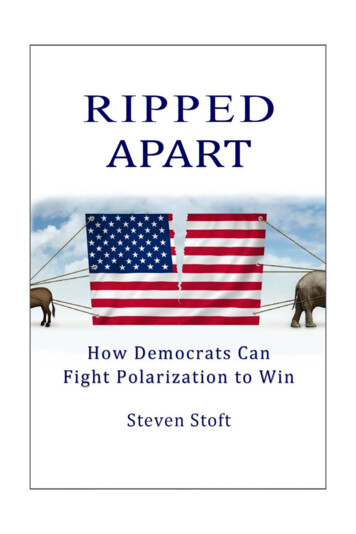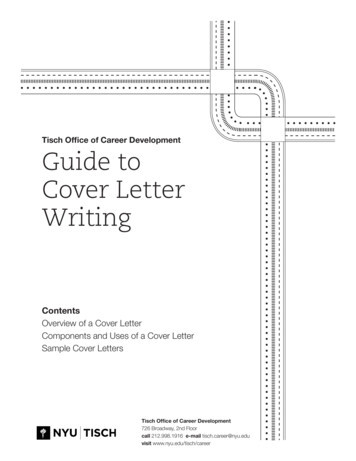
Transcription
Back Cover“Stoft has provided an incisive, highly readable roadmap for Democratic success—one that upends the self-destructive political myths unknowingly perpetuated by the party. He articulately exposes, one by one, how each of these hiddenmyths has placed a stranglehold on Democrats and has served only to divide theparty and provide fodder for Trump. Ripped Apart is a must-read for those whoare serious about preserving our Democracy.”—John Ballard, recipient along with others, ofThe Congressional Gold Medal and the NAACP Drum Major for Justice.A feature film director as well as a civil rights activist,Mr. Ballard is the author of African-American Consciousnesswith an introduction by Nelson Mandela.“Our democracy is as fragile as it is precious. Polarization—Trump's strategy—isits nemesis. So fight it we must. Ripped Apart shows exactly how polarizationharms us, and why understanding this will help us win. Read this book before it’stoo late.”—Ying Lee Kelley, former Berkeley City Council memberLegislative aide to Rep. Ron DellumsDemocratic Convention delegate for Jessie JacksonDemocrats should be winning—hands downWe’re right to be worried. Trump’s all-polls-average approval during hisimpeachment was higher than it was in most of 2017. How is that possible? Some Democrats are helping Trump fire up his base Some insinuate that fellow Democrats are corruptWho’s doing this? Despite making 117 endorsements in 2018, the three“revolutionary” PACs flipped zero House seats blue. They’re dedicated. But itwas those of us focused on winning, not purity, who flipped 43 House seats.The same radicals are galvanizing Trump’s base by calling themselves“socialists” and taking extreme positions. This just fuels Trump’s war room.Why don’t we stop them? The answer is disturbing yet empowering. We’vebeen deceived by radical mythology. By dispelling those myths, from crime-billslanders to excessive ‘wokeness,’ this book will leave you saying, “I knew thatsounded wrong. Now I know why.” Seeing through those myths will keep yousafe from other deceptions. This is the way back to a unified Party. It’s not easy.But failing that, we will hand Trump the fractured party that will let him win.
Ripped ApartHow Democrats CanFight Polarization to WinSteven StoftPolyScience PressBerkeley, California.
Copyright 2020 by Steven StoftAll rights reserved. Most progressive, non-profit use requests will be granted.Cover art: partially by James LarkinPolyScience Press2910 Elmwood CourtBerkeley, California 94705Notes and Documentation can be found at RippedApart.org.Ripped Apart: How Democrats Can Fight Polarization to WinSteven Stoft.—1st ed. (rev. 1.0.3)ISBN 978-0-9818775-2-5
Dedicated to the strategic liberalswho took back the House in 2018In theorythere is no difference between practice and theory.In practice, there is.—Yogi Berra
CONTENTS(Hyperlinked)Preface and AcknowledgmentsIntroduction: How Delusions Spark Polarizationviii1Part 1. What Polarizes Us?1.2.3.4.5.6.7.The Perils of PolarizationClear and Present DangerHow Polarization DevelopsHow to Depolarize a CyclopsThree Political TrapsThe Crime Bill MythThe Purity Trap12172328333848Part 2. Charisma Traps8. Smart People Get Sucked In9. Good People Get Sucked In10. Jonestown: Evil Charisma11. Alex Jones: More Evil Charisma12. The Charismatic Progressive13. Trump: Charismatic Sociopath555863697482Part 3. Populism Traps14.15.16.17.18.19.20.21.What is Populism and Why Should We Care?Trump: A Fake Jacksonian Populist‘Our Revolution’ Meets the JacksoniansEconomics vs. the Culture WarSanders’ Populist StrategyGood Populism: The KingfishUtopian PopulismDon’t Be the Enemy They Need9198105111117123130136
Part 4. Mythology Traps22.23.24.25.26.27.Socialism, Liberalism and All ThatSanders’ Socialism MythsThe Myth of the Utopian SaviorThe Establishment MythThe Myth of the Bully PulpitThe Myth of the Overton Window143150158165170178Part 5. Identity Politics28.29.30.31.32.33.34.35.When the Klan Went Low, SNCC Went HighWhat Is Identity Politics?Identity Politics—The Dark SideCultural AppropriationThe Microaggression HoaxRoots of the New Identity PoliticsPostmodernism: The Anti-TruthThe Ultimate Con Game187199205212218224232238Part 6. Wrap-up and Overview36.37.38.39.Radical-Left MythologyThe Tragic Paradox of RadicalismHow Progressive Change HappensPutting the Pieces Together253264275291Bibliography299Major Topics Index302Sidebar PagesDefined TermsxiPolitical Tribes in the U.S.16Traps and Polarization47Why You Will Find Teddy Roosevelt on Mount Rushmore 177
Preface and AcknowledgmentsMario Savio, fresh from civil rights work in Mississippi, took his shoesoff and climbed on top a police car in the middle of the U.C. Berkeleycampus to lead a sit-in. That was Day One of the free speech movementin 1964, and I was stuck in high school waiting for my freedom. But bythe next year, I was in Berkeley myself, protesting the Vietnam War, andthe year after that I was canvassing to put Ron Dellums on the BerkeleyCity Council (he would later cofound the Congressional Black Caucus).Soon after, in 1968, 17-year-old Black Panther Bobby Hutton waskilled by the Oakland Police after taking part in an ambush of the police(back then we heard the police ambushed the Panthers). I was arrestedfor posting an invitation to his funeral, but they could think of nothing tocharge me with.That summer, on a black-and-white television, I watched as MayorDaley’s Chicago police attacked nonviolent demonstrators protesting therigged 1968 Democratic Convention. As the protesters chanted “Thewhole world is watching,” I felt sure the country would finally see theestablishment for what it was, and we might even stop the war. This wasthe height of the 1960s revolution.With the best of intentions, we had launched the second great polarization of America. The first had led to Abraham Lincoln, the Civil Warand the end of slavery. No one in 1968, could imagine the consequencesunfolding today. And no one knows now where they will lead.That year I voted for the Black candidate from Chicago for president—Dick Gregory. He was a wonderful activist-comedian, but the radical left’s disdain for liberals probably handed the presidency to RichardNixon. After that, McGovern rejiggered the nomination process, whichallowed him to unseat Mayor Daley’s delegation, win the nomination,and lose the election by a landslide.That’s when I realized we had committed revolutionary suicide. Howlong would it take to clear out all the crazy ideas? Not the goals of peaceand equality, but the crazy self-righteous utopian “strategies” that tookno account of the real world. Having a math and astronomy background,I tried to calculate. My generation of activists would need to be replacedand that would take 20 to 25 years.
Preface⸱·⸱ixBiding my time, I taught middle school for a year, did my alternativeservice as a conscientious objector and wandered around Europe readingMarxist economics and quantum mechanics. I returned to Berkeley for aPh.D. in economics, started the newsletter for Berkeley Citizens Actionto hold the group together between biennial elections and advised CityCouncilwoman Ying Lee Kelley regarding the CETA federal job-trainingprogram. I had met Ying when we were both arrested at an antiwardemonstration. Fourteen of us won our suit for false arrest against theAlameda County Sheriffs.Bill Clinton did show up 20 years after I made my calculation, butwhere was the progressive movement?Then, after I’d given up hope, out of the blue, there was BarackObama. After 36 years. And there was a movement of progressives rightbehind him. They were not a reflection of the late ‘60s radicals. Theywere a little more like I had imagined the civil rights movement, YearOne of the free speech movement, and the start of the antiwar movement—thoughtful and dedicated but with a new upbeat sense of humor. Ithought I’d died and gone to heaven.But even before he was elected, I was driving with friends to a moviewhen the guy in the back seat, an old ‘60s radical, began ranting abouthow Obama was just a corporate shill, as bad as the Republicans. Myheart sank. I knew what this meant. I went online, and there they were,the baby-boomer radicals and their political descendants, all foaming atthe mouth.As the election neared, I found myself pacing the floor, asking myself: Do I want him to win? There was no question I’d vote for him. But Iknew the radical left. It would take them a while, but they would makelife hell for him. I couldn’t bear the thought. I had some idea how muchsupport he would need as our first Black president, facing a well-oiled,ultra-right-wing media machine.At a MoveOn meeting after his first midterm election, the few radicals there were crowing that they had given him a few dollars but had notworked for him—he was “such a disappointment.” Right. In two years,all he’d done was prevent another Great Depression, save the auto industry and pass Obamacare, the first big addition to FDR’s agenda since1965.Just before his second midterm election, Michael Moore summed upthe radicals’ view: “Mr. Obama, when the history is written of this era,this is how you'll be remembered: ‘He was the first Black president.’
x · Ripped ApartOkay, not a bad accomplishment, but that’s it. A big disappointment.”No Republican could have been more damaging than this inside hit job.As his second term ended, the radicals shifted into overdrive, and after eight years of sabotage, we lost by a hair. And they may well do itagain. The remnants of the baby-boomer radicals had passed down tolater generations their self-righteousness. It was a repeat of how I’d seenthe “red-diaper babies” corrupting the political movements of the early‘60s.Watching this unfold, I did my best to figure out how a small group ofdedicated, well-intentioned politicos could repeatedly stymie the verychanges they wanted. Yes, it was due to overreach on their part. It wasbelieving righteousness beats thinking. But why do they get away withit? Why don’t we dedicated liberals and radical liberals speak up? Andmost important, how can we stop Trump and get back on track?There was only one way to find out. I’d done this twice before, oncefor electricity markets and once for climate policy. I knew it would workand only take about three years. I’d write a book and explain it to myself. I enjoyed all the eye-opening surprises I found along the way. Ihope you do, too.For almost three years, Arlin Weinberger has been my constant soundingboard, constructive critic, and light-handed copy editor, all of which hasmade the process of discovery far more enjoyable, and the difficulties ofwriting, less daunting.My copyeditor Karel Kramer took on the nearly impossible job ofturning a mountain of excess detail into something readable and, when Ilet her, into something enjoyable. And many thanks to my proofreaderBob Cooper who brought consistency to my experimental approach to allthings grammatical. Remaining errors are due to my late changes.Thanks also for many helpful comments and pointers from JamesWeinberger, John Ballard, Judi and Hardy Dawainis, Carl Fuchshuber,Charlie Carlson, Pete Ordway, Dick Cheville, Nic Wood, and TimAaronson.
Defined Terms(just for reference)Political labels are constantly shifting, mean different things to differentpeople, and are highly contentious. But they are necessary for any intelligent discussion of politics. The best I can do is pick labels that havesome intuitive appeal and then define what I mean when I use them. Ofcourse, these definitions are still fuzzy because people are complicated.Radicals, the radicals left—Roughly, the left-most “tribe” as defined byMore in Common.* That’s about 8% of the population. In Part 6, Idefine this group more precisely as those following the utopian ethic.Liberals—Democratic voters who are not part of the radical left. In Part6, I redefine this group to those following the strategic ethic.Radical liberals—Those favoring radical change but who understandthat making strategic incremental changes is usually the fastest way tomake fundamental change, so they follow the strategic ethic.FDR liberals—Essentially the same as “liberals” but emphasizing thatthey agree with FDR, who captured the term “liberal” from theRepublicans and redefined it. Not a classic (libertarian) liberal and notsocialist. Includes modern views on civil rights.Progressives—All Democrats except the most conservative.Socialists—Those who believe capitalism and the profit motive must bereplaced by collective economic institutions.Democratic socialists—Any socialist since 1900 (except communistsocialists). When in quotes, this means a confused FDR liberal.Political Trap—A delusion that causes issue polarization.Moralistic Trap—A delusion that causes emotional polarization.Us / We—FDR liberals and radical liberals (these groups overlap almostcompletely).* The More in Common survey is explained after Chapter 1.
Introduction:How Delusions Spark PolarizationThe first principle is that you must not fool yourself—andyou are the easiest person to fool.—Richard Feynman(physicist, second only to Einstein)“An incendiary bomb, a thermite bomb, fell behind our house and burnedwith a terrible, white-hot heat my brothers carried pails of water to[my father], but water seemed useless against this infernal fire—indeed,made it burn even more furiously. . Meanwhile, the bomb was meltingits own casing and throwing blobs and jets of molten metal in all directions.”Oliver Sacks, the renowned neurologist and author, published a memoir of his childhood in 2001. He had grown up in London during WorldWar II, but it was a memory he would not “hesitate to swear on in a courtof law and had never doubted as real.”After his account of that night was published, an older brother assuredSacks that: “You never saw it. You weren’t there.” Sacks was astonished.Despite all his training, his own mind had deceived him.As his brother explained, “We were both away at Braefield at thetime. But David [our older brother] wrote us a letter about it.” WhenSacks carefully compared this manufactured “memory” to an equally oldand validated memory, he could find no difference in quality between thetwo.We know that millions can be deceived by political propaganda, but webelieve this happens because those being duped are biased “lowinformation voters” like we believe our political opponents to be. We areequally sure that our team, whoever they may be, can be trusted to haveaccurate information, at least on any point of significance.
2 · Ripped ApartBut what if that’s wrong? What if all our minds are designed to makeus feel far more certain than we have any right to be? Then our side mayalso be subject to delusions. Could such delusions, masquerading as certainties, cause the infighting that’s polarizing Democrats and adding tothe national polarization that is the lifeblood of Trumpism?As I will show, this is our plight, and the reason we will lose againunless we take corrective action.To solve a problem, first admit there is a problem, then comprehendits magnitude. Most of us have peeked at these delusions, but we still failto recognize them when we ourselves are most in danger.So let me show you some hair-raising examples. Some are believedby millions of good Democrats yet cause untold damage to our cause.Skeptical about this? Good. Skepticism is your friend in this battle, butit’s not enough. We need evidence.When I started researching this book, I had recently read a review of OnDeaf Ears: The Limits of the Bully Pulpit—a book by political scientistGeorge Edwards, based on 10 years of research, showing that presidentsnearly always fail in their attempts to persuade the public. And not infrequently, presidents speaking from their “bully pulpit” have even had thereverse effect of what they intended.For example, Edwards found that support for “regulatory programsand spending on health care, welfare, urban problems, education, environmental protection and aid to minorities all increased rather than decreased” during the presidency of Ronald Reagan. Known as “the greatcommunicator,” he had opposed all of these programs from his bullypulpit. And he had favored increased defense spending yet support forthat decreased.However, I soon came upon an argument by someone I trusted whoseemed to be staking his political reputation on the contention that thebully pulpit works wonders. Because he was an economist, as I am, Isuspected he might not be up on his political science. So I decided tocheck. What I discovered was a political version of the manufacturedthermite-bomb memory.What the Expert SaidRobert Reich has long been one of my minor heroes because he exposessocioeconomic problems simply and with humor. Furthermore, his cre-
Introduction · 3dentials as a policy expert with hands-on political experience are unmatched. He served under Presidents Ford and Carter, became Clinton’sSecretary of Labor, and was part of Obama’s transition team. He is theChancellor's Professor of Public Policy at U.C. Berkeley’s GoldmanSchool of Public Policy and has taught at Harvard’s John F. KennedySchool of Government. He has been a contributing editor of The NewRepublic, The American Prospect, The Atlantic, The New York Times,and The Wall Street Journal.Given his leftward leanings and his expertise, it is no great surprisethat he became Bernie Sanders' most illustrious and astute surrogate andinterpreter. And unlike many of Sanders’ supporters, he treated HillaryClinton fairly, possibly because their political backgrounds overlapped,and they had become friends.Reich kept a cool head in the Sanders-Clinton war even when he explained in a 2016 op-ed why Clinton would make the best president forthe status quo, but Sanders would be the only president who could bringabout fundamental change.His argument was simply put and powerful: Sanders was the one whowould use the “bully pulpit” of the presidency to lead Americans to standup for positive social change. Clinton, like Obama, would only be a“dealmaker-in-chief.” That’s a persuasive argument only if the bully pulpit really works. And Reich knew that.To prove it worked, he used the example of how Teddy Roosevelt hadachieved four miraculous progressive changes by using his bully pulpit:1. “A progressive income tax,2. Limits on corporate campaign contributions,3. Regulation of foods and drugs, and4. The dissolution of giant trusts.”All that from His Presidential Pulpit?I had heard the usual things about Roosevelt, so I was not surprised bythe list of his accomplishments. But On Deaf Ears had me doubting thatall this was mainly the result of Teddy’s preaching. I read what is considered the best biography of Roosevelt, The Bully Pulpit, and then double-checked a few more sources. Here is what I found:1. The income tax. The Democrats passed the first federal income tax in1894, and it was highly progressive. But the next year it was declaredunconstitutional, and it remained so until the 16th Amendment to the
4 · Ripped ApartConstitution was ratified in 1913. Teddy Roosevelt was president from1901 to 1909. So he had nothing to do with “getting a progressive income tax.” He didn’t even push for it.What was Reich talking about?!It seemed incredible that such an experienced and esteemed policyexpert could be so completely wrong about something so central to hispolitics and so easily checked. And he was spreading this myth to tens ofthousands of his devoted followers.To top it off, the real story shows the exact opposite of Reich’s theory—we got the income tax through, you guessed it, exactly what Reichsaid Clinton was best at, political dealmaking! President Howard Taftchampioned the 16th Amendment and secured its ratification. Accordingto Doris Kearns Goodwin, author of The Bully Pulpit:As he pursued his tax agenda with [Senator] Aldrich, Taft engagedin “some pretty shrewd politics.” He met individually with members of the Finance Committee and “committed them separately”to [backing the 16th Amendment].That’s not using a bully pulpit. That’s back-room dealmaking, andthat’s how we got a progressive income tax.2. Campaign contributions. In his first run for president, in 1904,Teddy Roosevelt and the Republicans were caught taking enormous corporate campaign contributions. The most radical of the era’s famous progressive journalists argued privately that he should give them back.Roosevelt refused and argued that it was “entirely legitimate to acceptcontributions, no matter how large,” provided they were freely given.Finally, under mounting political pressure, he signed a bill, written by hisarchenemy, “Pitchfork Ben,” limiting contributions—but lacking an enforcement mechanism.I was prepared for Reich to overplay the bully-pulpit myth, but I wastotally unprepared to discover that Reich had misled me about which sideof an issue Roosevelt was on.As I describe in Chapter 26, Reich’s last two points are also misfires.Food and drug regulations were largely spurred by Upton Sinclair’sbook, The Jungle, and public sentiment for trust-busting was whipped upby Ida Tarbell's book, The History of Standard Oil. These books were sopowerful that both are still in print today.Sadly, Roosevelt's most well-known “accomplishment” preachingfrom his bully pulpit had the unwanted consequence that his favorite
Introduction · 5progressive investigative journalists (especially Ida Tarbell) were ridiculed as “muckrakers,” severely damaging their credibility.Yes, just as On Deaf Ears had alerted me, using the bully pulpit is unreliable at best—even when used by Teddy Roosevelt himself. Fortunately, Roosevelt was an excellent dealmaker-in-chief (and proud of it), andhe really does deserve his place on Mount Rushmore.Don’t Blame Robert ReichEverything that I checked turned out to be backward or at least sideways.Yes, the developments cited by Reich did happen but not because ofTeddy’s preaching, and sometimes against his will or when he was nolonger president. How could an advisor to four presidents and a renowned professor at the nation’s top two policy schools possibly be socompletely wrong about the political topic he cared most about? I wasflummoxed.It seemed impossible that he could be that wrong, and I was just assure he wasn’t lying. Then I remembered Oliver Sacks. Reich probablydidn’t check any source because his memory was so vivid that he wouldnot, as Sacks put it, “hesitate to swear on it in a court of law.”Exactly what he “remembered” I cannot say, but I myself had “remembered” enough about Roosevelt that I did not doubt Reich’s fourmistaken “facts” about what Roosevelt deserved credit for; I only doubted that Teddy's bully pulpit was the force behind these accomplishments.The bully pulpit myth is, however, so well established that most peoplestill believe it. Before George Edwards wrote On Deaf Ears, pretty muchthe whole political-science community believed it, as well as most presidents.I feel certain that Reich had heard many things over many years so, asSacks put it, this could have led to “subsequently constructing a‘memory’ that became more and more firmly fixed by repetition.”Why it MattersBoth sides, Republicans and Democrats, believe they have personal qualities that protect them from political delusions. To some extent, that’strue. We don’t fall for most of the nonsense that surrounds us. But whatwe do fall for can do us great harm. Because I’m interested in protectingand strengthening the liberal side, I pay more attention to our myths anddelusions than to conservative ones.
6 · Ripped ApartThat’s why I’ve chosen the bully pulpit example. It shows, beyond ashadow of a doubt, that the characteristics we all assume will protectus—concern for the public good, intelligence, education, and politicalexperience—are insufficient, even if we possess them in abundance, asdoes Robert Reich. So we should not be surprised to find that politicalmyths and delusions are the main drivers of politics, even on our side.Delusions are common, but are they so damaging? Consider the bully-pulpit myth, which has long been widespread. Reich tells us thatObama failed to use his bully pulpit, and so he “allowed powerful interests to cash in” to the tune of “about 16 billion a year” paid to the drugindustry. This turns what seems to be the harmless, feel-good bullypulpit myth into the beginnings of polarization.No one can know that using his bully pulpit would have worked, andEdward’s research shows it’s quite likely Obama could not have donewhat Reich assumes would have been a sure bet. Taking Reich’s advicecould have even made things worse. Of all people, shouldn’t Obamahave been considered innocent until proven guilty? Especially when theonly evidence against him was baseless speculation.Convicting Obama. In fact, Obama was not just convicted of making amistake. The radicals convicted him of intentional harm with maliceaforethought. This transforms a discussion of issues into moralisticjudgments, which are the basis of “emotional polarization.” That’s thekind ripping us apart.At a MoveOn meeting that I attended after the Democrats “took ashellacking” in his first midterm elections, two radicals who had workedhard for him in 2008 said they hadn’t worked at all on the midterms—they had only come to the meeting to carp about how Obama had deceived us about who he really was.Their view was common among radicals, and it had set in early. Tomark his first 100 days in office, Katrina Heuvel, the radical editor ofThe Nation, had warned that if Obama did not win the public healthcare
Introduction · 7option, that would show that he had not been making “necessary compromises” but had instead been unnecessarily “watering down policies toappease for-profit special interests.”Heuvel, a fan of the bully-pulpit myth, was sure that Obama couldwin the public option if he really wanted to. She was so sure Obamaknew this—that if he didn’t use his bully pulpit and succeed, then hemust be corrupt, an appeaser of “for-profit special interests.” Most of theradical left agreed.She too was led toward emotional polarization by the bully-pulpitmyth. Such polarization weakened Obama and the Democrats for eightyears. Then the bully-pulpit myth was used to damage Clinton in theprimaries, and that had a lingering effect when she ran against Trump.The ‘New Jim Crow.’ It’s worth looking at one more dramaticallywrong example of a delusion that’s still polarizing the Democrats andhelping Trump win.The ‘New Jim Crow’ myth claims that mass incarceration of Blackswas a substitute for the Jim Crow laws, which were overturned by the1964 Civil Rights Act. It further claims that the Democrats were toblame and did it for racist reasons. That’s about the worst accusation youcan imagine being leveled against the Democrats—that racist Democratsput about a million blacks in jail while trying to pick up a few Southernracist votes.Again, this was coming entirely from the radical left of the Democratic Party. The Nation published “Why Hillary Clinton Doesn't Deserve theBlack Vote” just as the 2016 primaries were getting started. It was written by Michelle Alexander, author of The New Jim Crow, which spentthree years as a New York Times bestseller. About that time, Clinton wasaccused on MSNBC of calling Blacks “superpredators” to help pass the1994 crime bill. The Atlantic published the same claim and linked to thesame video of Clinton that was shown on MSNBC.Oddly, no one noticed that every frame of the video clearly showedthe date was 1996 (not 1994) or that Clinton was not talking aboutBlacks or the crime bill. And the problem is much deeper than that. The1994 crime bill had the support of the majority of Blacks, especiallyBlack leaders (Ch. 5). Of course, the radicals never mention that, although it’s an easy fact to find. Like Robert Reich, they are so surethey’re right that they don’t feel any need to check.This polarizing racial smear against Clinton was used by Trump andRussian trolls on the internet and by Trump in the debates. Undoubtedly,
8 · Ripped Apartit cost Clinton votes among Whites as well as Blacks, and it certainlyhelped elect Trump. Such radical myths (fake history) should not be taken lightly.Negative Partisanship and National PolarizationNational polarization—hating the other political party—naturally causespeople to get out and vote for their side, even if they don’t much liketheir own candidate. That’s called negative partisanship, and it now dominates national politics.With people thinking like that, the best way to get out the vote is totell frightening stories about how evil or crazy the other party is. Andthat’s just what social media and some of the press often does.That’s why the more extreme elements of the Democratic Party are sohelpful to Trump. They take positions that fire up his base and turn outthe Republican vote. Of course, this effect is tremendously amplified bythe likes of Fox News and even more-extreme, right-wing news outlets.The more flamboyant their “crazy Democrats” story, the better.For example, the Madison, Wisconsin school district adopted a rulebarring the use of the n-word regardless of circumstances. After muchracist harassment, when a Black playground attendant finally said “Don’tcall me nigger” he was fired! (Ch. 29). Of course, the right uses this toconfirm the right-wing belief that no one can escape the left’s politicallycorrect charges of racism, not even a well-loved, cautious, Black playground attendant. That polarizes Republicans against Democrats andfires up Trump’s base.Then there’s the idea that democratic socialists are not socialists, justas Bartlett pears are not pears (whatever). This is wrong, and it alsoneedlessly ties the Democratic Party to “socialism,” by far the most polarizing label in politics.There are many more of these nationally polarizing myths, believedby millions. All of them play i
Charisma Traps 8. Smart People Get Sucked In 55 9. Good People Get Sucked In 58 10. Jonestown: Evil Charisma 63 11. Alex Jones: More Evil Charisma 69 12. The Charismatic Progressive 74 . The Myth of the Utopian Savior 158 25. The Establishment Myth 165 26. The Myth of the Bully Pulpit 170 27. The Myth of the Overton Window 178 Part 5 .










